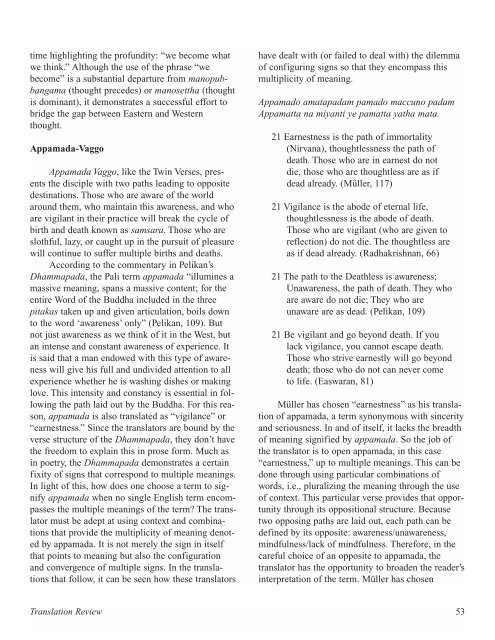Translation Review - The University of Texas at Dallas
Translation Review - The University of Texas at Dallas
Translation Review - The University of Texas at Dallas
You also want an ePaper? Increase the reach of your titles
YUMPU automatically turns print PDFs into web optimized ePapers that Google loves.
time highlighting the pr<strong>of</strong>undity: “we become wh<strong>at</strong><br />
we think.” Although the use <strong>of</strong> the phrase “we<br />
become” is a substantial departure from manopubbangama<br />
(thought precedes) or manosettha (thought<br />
is dominant), it demonstr<strong>at</strong>es a successful effort to<br />
bridge the gap between Eastern and Western<br />
thought.<br />
Appamada-Vaggo<br />
Appamada Vaggo, like the Twin Verses, presents<br />
the disciple with two p<strong>at</strong>hs leading to opposite<br />
destin<strong>at</strong>ions. Those who are aware <strong>of</strong> the world<br />
around them, who maintain this awareness, and who<br />
are vigilant in their practice will break the cycle <strong>of</strong><br />
birth and de<strong>at</strong>h known as samsara. Those who are<br />
slothful, lazy, or caught up in the pursuit <strong>of</strong> pleasure<br />
will continue to suffer multiple births and de<strong>at</strong>hs.<br />
According to the commentary in Pelikan’s<br />
Dhammapada, the Pali term appamada “illumines a<br />
massive meaning, spans a massive content; for the<br />
entire Word <strong>of</strong> the Buddha included in the three<br />
pitakas taken up and given articul<strong>at</strong>ion, boils down<br />
to the word ‘awareness’ only” (Pelikan, 109). But<br />
not just awareness as we think <strong>of</strong> it in the West, but<br />
an intense and constant awareness <strong>of</strong> experience. It<br />
is said th<strong>at</strong> a man endowed with this type <strong>of</strong> awareness<br />
will give his full and undivided <strong>at</strong>tention to all<br />
experience whether he is washing dishes or making<br />
love. This intensity and constancy is essential in following<br />
the p<strong>at</strong>h laid out by the Buddha. For this reason,<br />
appamada is also transl<strong>at</strong>ed as “vigilance” or<br />
“earnestness.” Since the transl<strong>at</strong>ors are bound by the<br />
verse structure <strong>of</strong> the Dhammapada, they don’t have<br />
the freedom to explain this in prose form. Much as<br />
in poetry, the Dhammapada demonstr<strong>at</strong>es a certain<br />
fixity <strong>of</strong> signs th<strong>at</strong> correspond to multiple meanings.<br />
In light <strong>of</strong> this, how does one choose a term to signify<br />
appamada when no single English term encompasses<br />
the multiple meanings <strong>of</strong> the term? <strong>The</strong> transl<strong>at</strong>or<br />
must be adept <strong>at</strong> using context and combin<strong>at</strong>ions<br />
th<strong>at</strong> provide the multiplicity <strong>of</strong> meaning denoted<br />
by appamada. It is not merely the sign in itself<br />
th<strong>at</strong> points to meaning but also the configur<strong>at</strong>ion<br />
and convergence <strong>of</strong> multiple signs. In the transl<strong>at</strong>ions<br />
th<strong>at</strong> follow, it can be seen how these transl<strong>at</strong>ors<br />
have dealt with (or failed to deal with) the dilemma<br />
<strong>of</strong> configuring signs so th<strong>at</strong> they encompass this<br />
multiplicity <strong>of</strong> meaning.<br />
Appamado am<strong>at</strong>apadam pamado maccuno padam<br />
Appam<strong>at</strong>ta na miyanti ye pam<strong>at</strong>ta y<strong>at</strong>ha m<strong>at</strong>a.<br />
21 Earnestness is the p<strong>at</strong>h <strong>of</strong> immortality<br />
(Nirvana), thoughtlessness the p<strong>at</strong>h <strong>of</strong><br />
de<strong>at</strong>h. Those who are in earnest do not<br />
die, those who are thoughtless are as if<br />
dead already. (Müller, 117)<br />
21 Vigilance is the abode <strong>of</strong> eternal life,<br />
thoughtlessness is the abode <strong>of</strong> de<strong>at</strong>h.<br />
Those who are vigilant (who are given to<br />
reflection) do not die. <strong>The</strong> thoughtless are<br />
as if dead already. (Radhakrishnan, 66)<br />
21 <strong>The</strong> p<strong>at</strong>h to the De<strong>at</strong>hless is awareness;<br />
Unawareness, the p<strong>at</strong>h <strong>of</strong> de<strong>at</strong>h. <strong>The</strong>y who<br />
are aware do not die; <strong>The</strong>y who are<br />
unaware are as dead. (Pelikan, 109)<br />
21 Be vigilant and go beyond de<strong>at</strong>h. If you<br />
lack vigilance, you cannot escape de<strong>at</strong>h.<br />
Those who strive earnestly will go beyond<br />
de<strong>at</strong>h; those who do not can never come<br />
to life. (Easwaran, 81)<br />
Müller has chosen “earnestness” as his transl<strong>at</strong>ion<br />
<strong>of</strong> appamada, a term synonymous with sincerity<br />
and seriousness. In and <strong>of</strong> itself, it lacks the breadth<br />
<strong>of</strong> meaning signified by appamada. So the job <strong>of</strong><br />
the transl<strong>at</strong>or is to open appamada, in this case<br />
“earnestness,” up to multiple meanings. This can be<br />
done through using particular combin<strong>at</strong>ions <strong>of</strong><br />
words, i.e., pluralizing the meaning through the use<br />
<strong>of</strong> context. This particular verse provides th<strong>at</strong> opportunity<br />
through its oppositional structure. Because<br />
two opposing p<strong>at</strong>hs are laid out, each p<strong>at</strong>h can be<br />
defined by its opposite: awareness/unawareness,<br />
mindfulness/lack <strong>of</strong> mindfulness. <strong>The</strong>refore, in the<br />
careful choice <strong>of</strong> an opposite to appamada, the<br />
transl<strong>at</strong>or has the opportunity to broaden the reader’s<br />
interpret<strong>at</strong>ion <strong>of</strong> the term. Müller has chosen<br />
<strong>Transl<strong>at</strong>ion</strong> <strong>Review</strong> 53

















